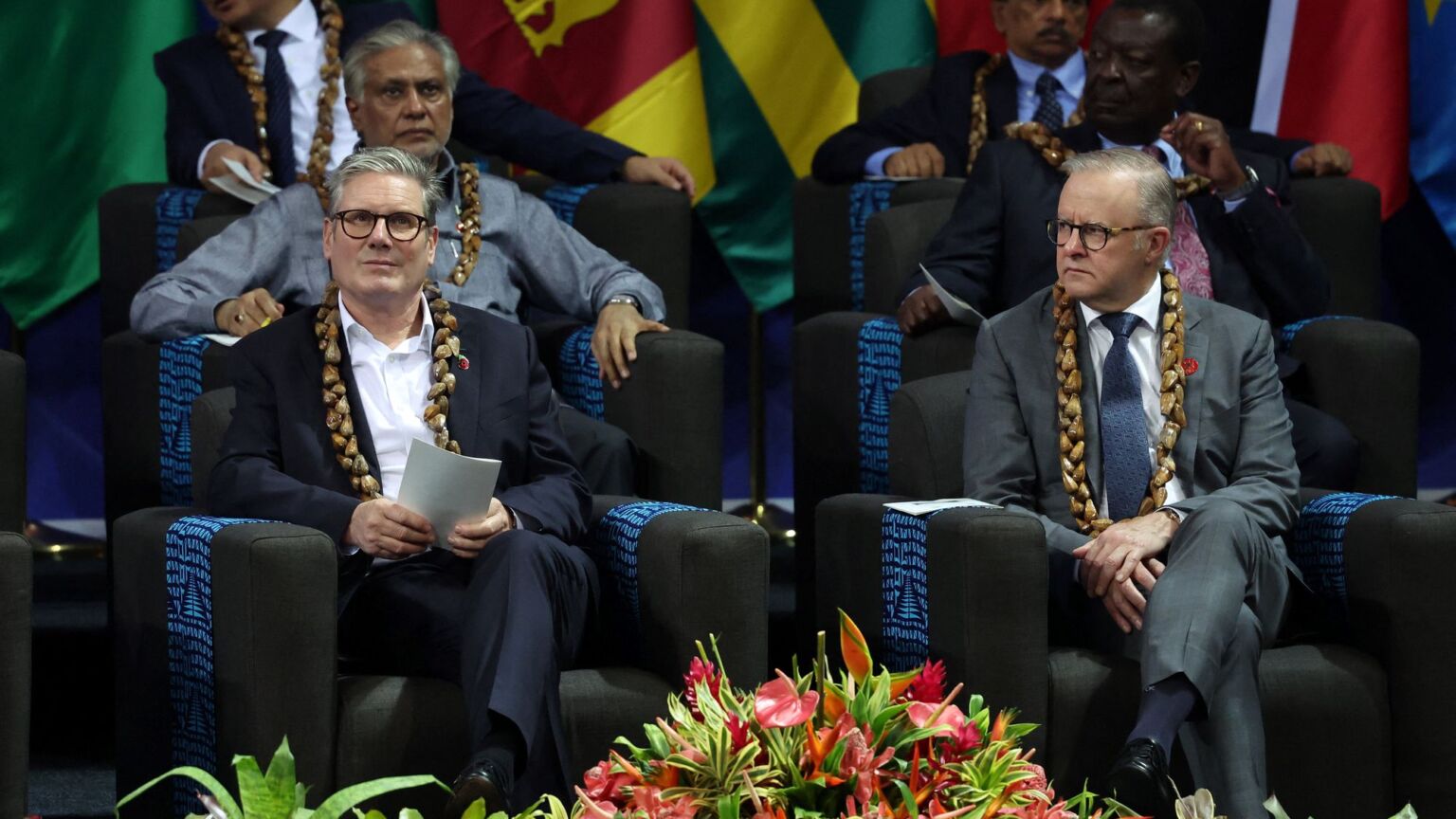Anthony Albanese shows the disaster in store for Starmer
Keir Starmer has an eerie amount in common with Australia’s stiff, humourless and deeply unpopular PM.

Want to read spiked ad-free? Become a spiked supporter.
Two years ago, hardly anyone would have thought it possible that the Liberal Party’s Peter Dutton, the leader of the parliamentary opposition in Australia, had a shot at defeating Anthony Albanese to become the next prime minister. But recent polling from Down Under suggests that, as little as six months out from the next federal election, an unlikely Dutton victory is well within reach.
These polls wouldn’t normally be of interest to a UK prime minister if it wasn’t for the striking similarities between the ailing government of Albanese and Starmer’s own administration. What’s happened to Albanese might therefore provide a hint of what’s to come for Starmer.
After all, Starmer and Albanese share much in common. Both have made much of their humble origins. Just as Starmer has repeatedly reminded people that his father was a toolmaker, so Albanese has made much of being raised by a single mother in state housing. They both began their political careers on the left (or, in Starmer’s case, posed as left-wing to win his party’s leadership election). They then presented themselves as centrists, before embarking on a final push to the top of the greasy pole of politics. And, on a personal level, both come across as rigid and humourless.
Albanese came to power in 2022, when his Labor Party defeated the lame-duck conservative Liberal-National coalition, which had been in power since 2013. Yet despite the coalition’s incompetence and dysfunction, including coups against three prime ministers, Labor’s first-preference vote share of 33 per cent represented its worst performance at a federal election since 1904. The party’s ‘small target’ election strategy, while successful, was reflected in the uninspiring scale of its victory.
Still, the Australian media praised Albanese when he gained power, much as the British media praised Starmer this summer. They claimed he was leading a ‘government of grown-ups’ and that the chaos of the coalition years was over. This proved to be premature.
Albanese spent his first year in power pushing for the Indigenous Voice to Parliament – an attempt to radically change the constitution on identitarian grounds that was barely a footnote in his election campaign. Despite his best efforts and millions of taxpayer dollars, Aussies overwhelmingly rejected the proposal in a referendum last October.
Given Albanese’s blandness, few would have suspected him of anything sleazy. But it turned out that, along with holding a constitutional referendum, one of Albanese’s first acts as prime minister was to get his son access to the super-exclusive Qantas Chairman’s Lounge. A new book also alleges that Albanese made personal calls to then-Qantas chief executive Alan Joyce to request free flight upgrades when he was transport minister in the 2000s.
Albanese’s other failures have come as less of a surprise. Australia, despite being among the world’s biggest exporters of coal and liquid natural gas, has experienced crippling increases in energy prices as a result of Labor’s enthusiasm for wind and solar energy. Record numbers of businesses have hit the wall and kept inflation unmanageably high for most Australians.
So far, Starmer’s government has followed an eerily similar playbook. His election victory was hailed as a ‘landslide’ and return of ‘adults’ to government. But as has been frequently pointed out, in reality it was a ‘loveless landslide’. His ‘broad but shallow’ majority was achieved on the second-lowest electoral turnout since the establishment of universal suffrage. In fact, despite the media hype, Starmer received fewer votes in 2024 than the inept Jeremy Corbyn did in 2019, when Labour suffered an historic defeat. Just one in five eligible voters supported Labour in July – even though, just as it was for the Australian Labor Party, Starmer’s main competition was a tired and incompetent government that had long outstayed its welcome.
Starmer, too, has been dogged by allegations of sleaze since entering government. His willingness to allow himself to be kitted out in more than £15,000 of clothing by Lord Alli and accepting tens of thousands of dollars in Arsenal tickets may well turn out to be his Qantas moment. Albanese and Starmer both posed as holier-than-thou in opposition. And yet they have both appeared stunned at the negative reaction to their blagging. Their insistence that they followed the ‘rules’ – apparently the only meaningful ethical standard for technocrats – seems to have blinded them to their hypocrisy.
With all the similarities between the British and Aussie governments, most Australian observers won’t have been surprised to see Starmer’s approval ratings dip below those of defeated PM Rishi Sunak. The bad news for ‘Free Gear Keir’ is that, unlike ‘AirBus Albo’, his prime ministership was barely three months old before voters developed buyer’s remorse.
Still, this also means Starmer has time to turn things around – if he’s prepared to heed some of the warning signs from Down Under.
Hugo Timms is an intern at spiked.
Picture by: Getty.
Who funds spiked? You do
We are funded by you. And in this era of cancel culture and advertiser boycotts, we rely on your donations more than ever. Seventy per cent of our revenue comes from our readers’ donations – the vast majority giving just £5 per month. If you make a regular donation – of £5 a month or £50 a year – you can become a and enjoy:
–Ad-free reading
–Exclusive events
–Access to our comments section
It’s the best way to keep spiked going – and growing. Thank you!









Comments
Want to join the conversation?
Only spiked supporters and patrons, who donate regularly to us, can comment on our articles.